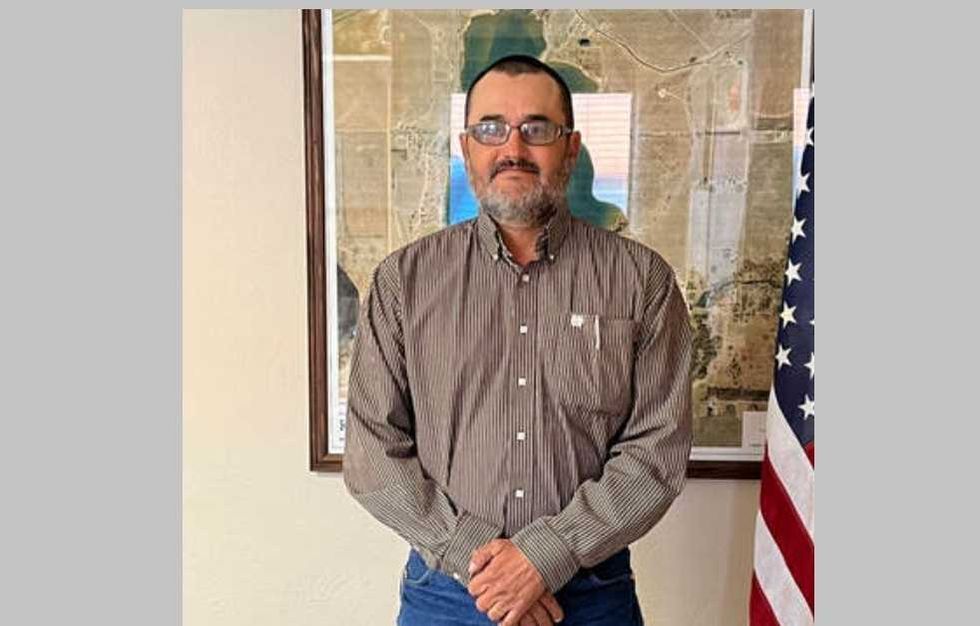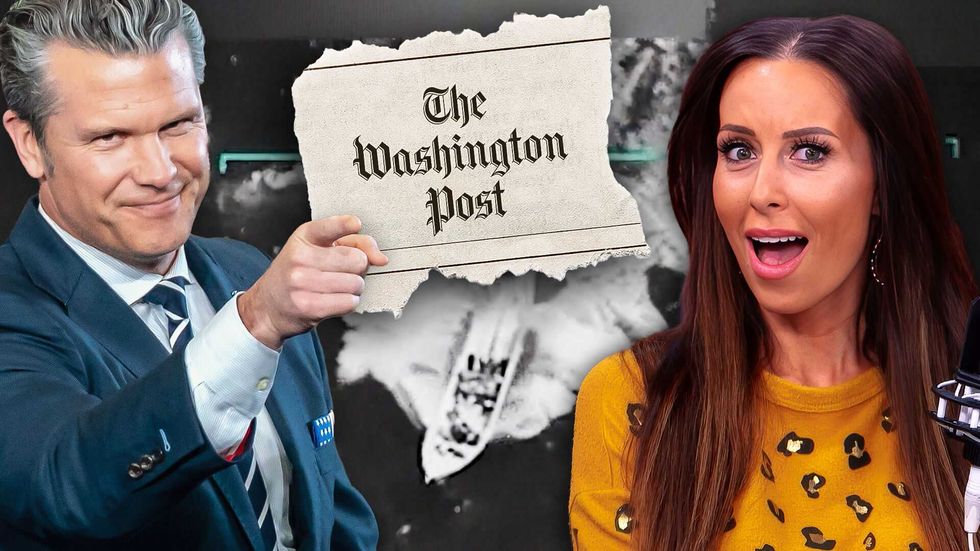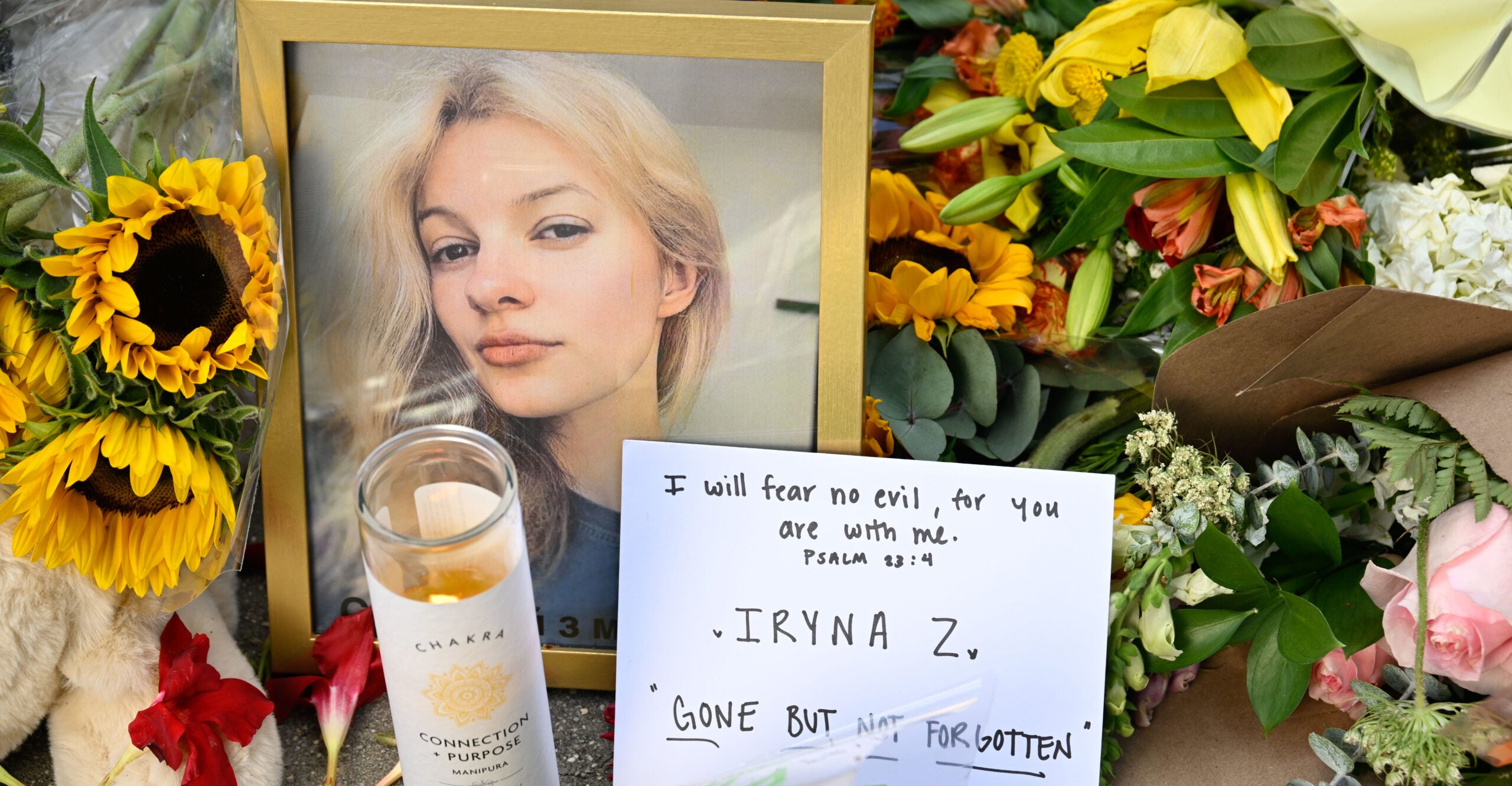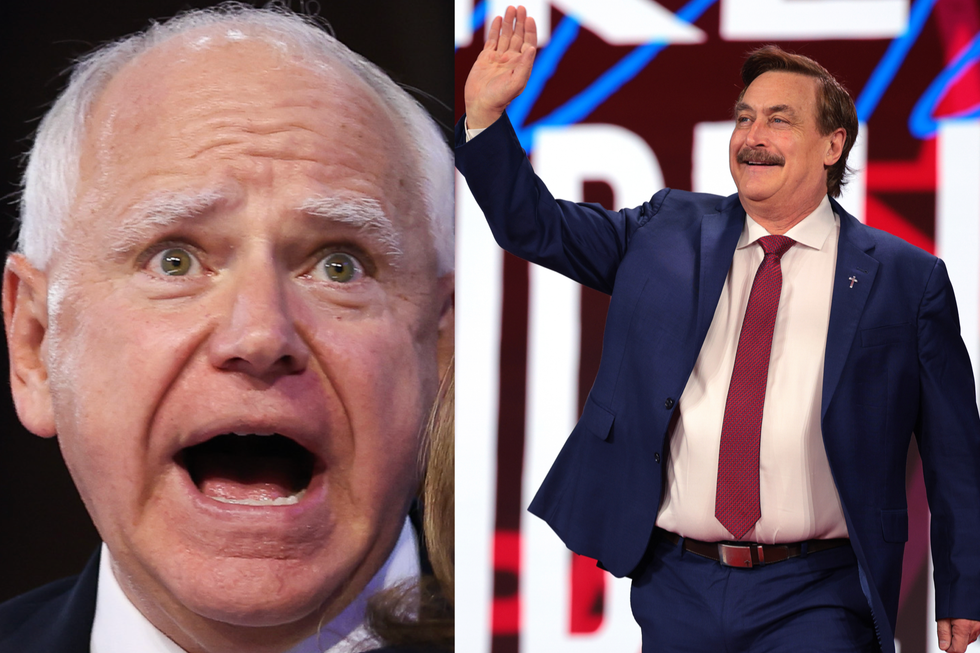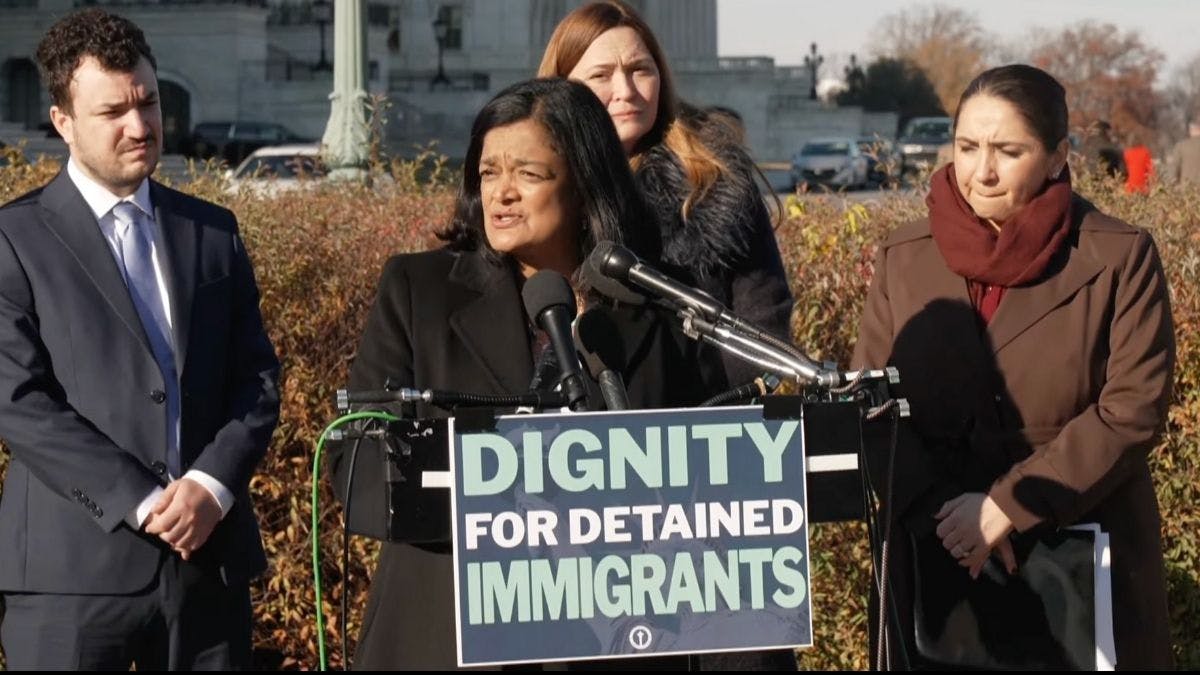Santa Ono’s DEI disaster: Florida board stands firm, refuses to rubber-stamp controversial university nomination
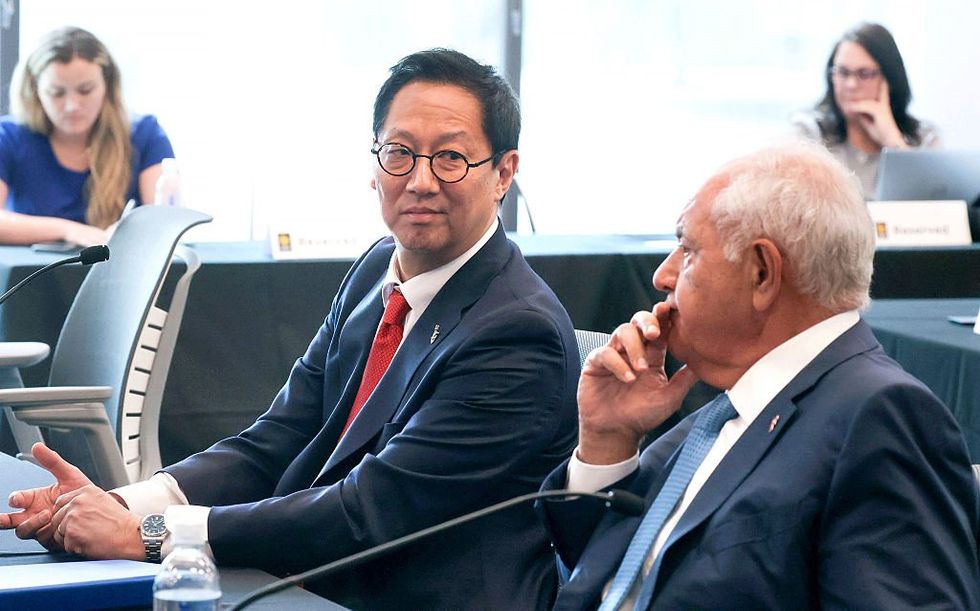
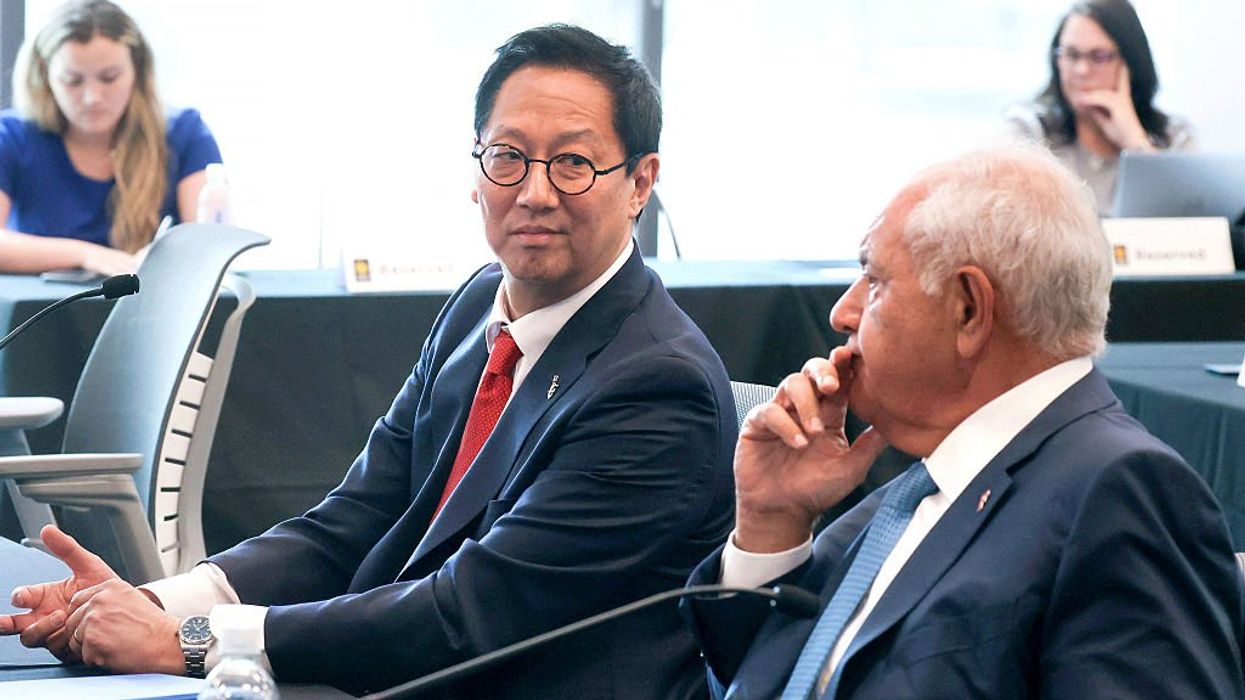
Earlier this month, a former DEI-loving University of Michigan president suffered national embarrassment after Florida higher-ed officials voted against his nomination to become the next president of the University of Florida. The vote shows that the academic's professed change of heart on DEI was met with significant skepticism.
Earlier this month, Santa Ono — the former University of Michigan president who spent years advocating for diversity, equity, and inclusion only to distance himself from the woke philosophy in recent months — suffered national embarrassment after Florida higher-ed officials voted against his nomination to become the next president of the University of Florida. The vote shows that the academic's professed change of heart on DEI was met with significant skepticism.
Ono's failed nomination and the allegations of serious academic misconduct still hovering around several former Ivy League leaders indicate that far-left causes célèbres, especially regarding DEI, seem to have fallen out of favor even at the university level.
Perhaps more importantly, it seems the work of some high-profile university administrators is finally facing much-needed scrutiny.
RELATED: Harvard president Claudine Gay resigns in disgrace, paints herself as a victim of 'racial animus'
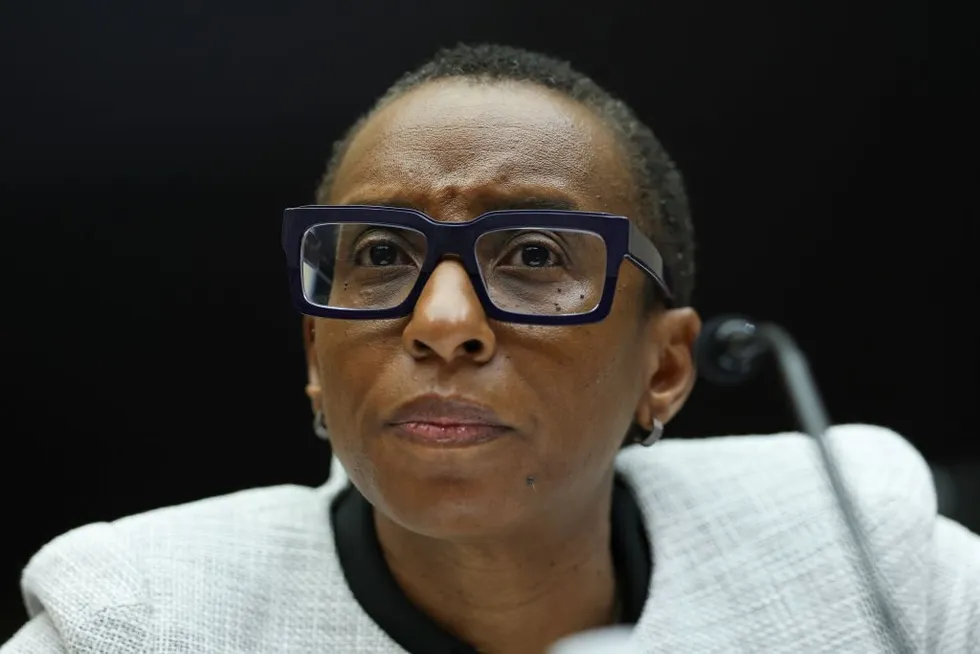 Photo by Kevin Dietsch/Getty Images
Photo by Kevin Dietsch/Getty Images
All the right credentials, all the right politics
Santa Ono is a familiar face in higher education. At 62 years old, Ono has served as president at some of the most prestigious universities in North America: Michigan, British Columbia, and Cincinnati. He has a PhD in experimental medicine from McGill University, is an immunologist, and once worked as an associate professor at the Harvard School of Medicine.
And until recently, Ono had unapologetically embraced DEI. For instance, he stated that "systemic racism is embedded into every corner of any institution," claimed he and his family had been victims of systemic racism, and pledged to do "the work" of eradicating systemic racism from the University of Michigan through a program he called "DEI 2.0."
To his credit, Ono did withstand slings and arrows from UM radicals after he axed DEI 2.0 in March, following President Donald Trump's executive order banning DEI practices. However, he admitted to nixing the program mainly on account of "federal executive orders, guidance, and funding cuts bringing urgency to the issue," not because of any personal misgivings about it.
'I’m excited to be part of that.'
In early May, reports began to circulate that Ono was vying for the presidential position at the University of Florida, vacated last summer by Republican former U.S. Sen. Ben Sasse of Nebraska. The news that Ono was leaving UM shocked many since he seemed deeply committed to the school. Having just joined it in 2022, Ono then signed a contract in October that extended his tenure as president there until 2032.
RELATED: From Wuhan to Michigan: Feds nab ANOTHER Chinese scholar in alleged bio-material smuggling plot
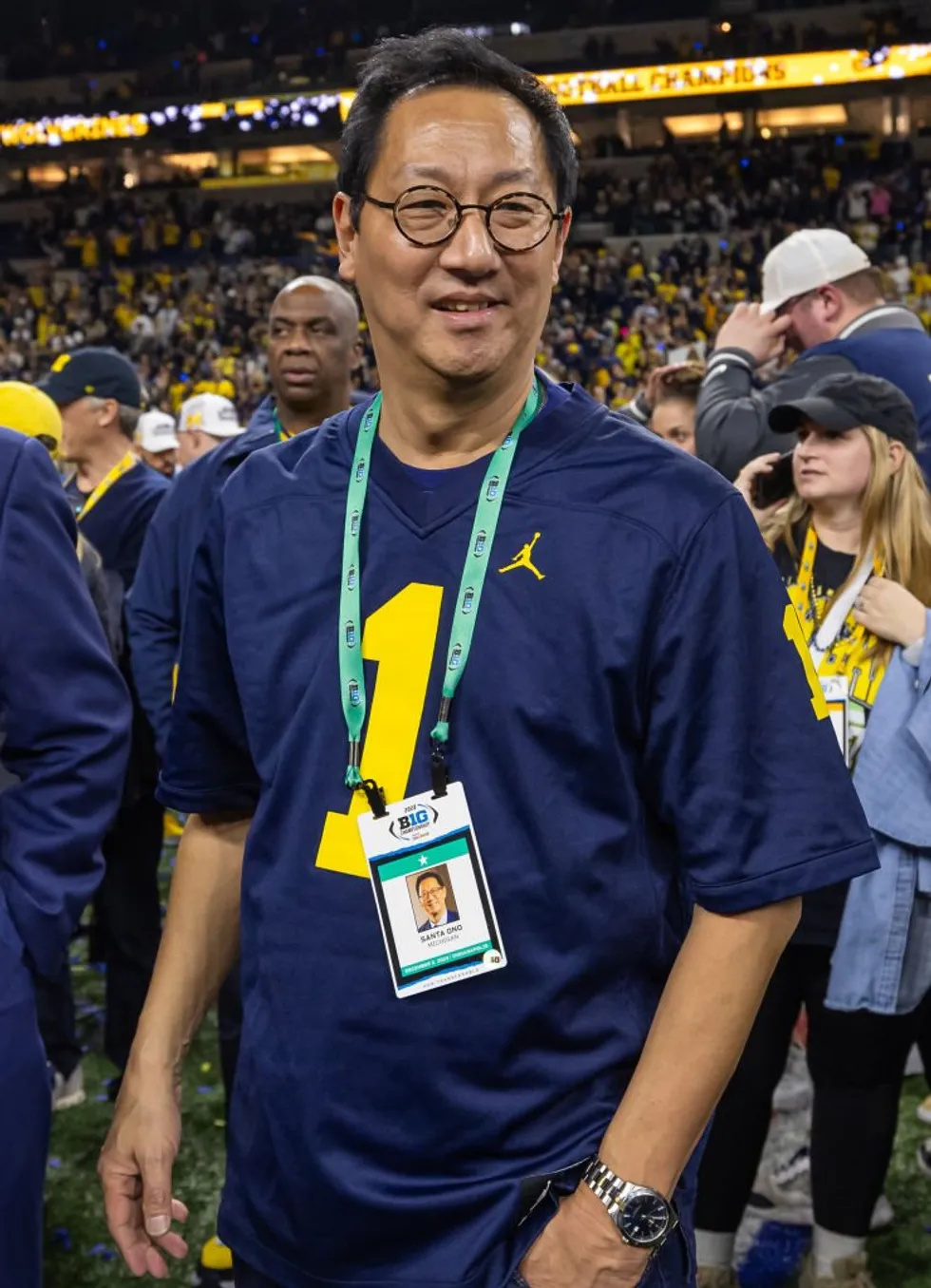 Photo by Michael Hickey/Getty Images
Photo by Michael Hickey/Getty Images
Still, announcements about Ono's candidacy published as early as May 4 revealed he was the only person the search committee had recommended for the Florida job. The UF Board of Trustees then voted unanimously to approve him on May 27.
Ono's confirmation at UF seemed all but assured.
He certainly expressed confidence. In an op-ed entitled "Why I Chose the University of Florida" published by Insider Higher Ed on May 8, Ono wrote: "Florida is building something truly exceptional. I’m excited to be part of that."
Then, Ono ran into Florida officials focused on removing leftist ideology from the state's university system.
Anti-woke board challenges Ono on DEI record
Since his re-election in 2022, Republican Gov. Ron DeSantis has worked hard to purge wokeness from all levels of education under his purview. As governor, DeSantis is entrusted with appointing individuals who share his values to the university system board of governors to oversee the state's 12 universities, including the University of Florida.
Ono seemingly understood that his previous promotion of DEI could harm his chances of landing a job in a state like Florida, which is wary of neo-Marxism, critical race theory, and DEI. So in the Inside Higher Ed op-ed, he copped to his erstwhile support for DEI, claiming he believed it was originally intended to ensure "equal opportunity and fairness for every student" but that it had unfortunately morphed into an agent of "ideology, division, and bureaucracy."
'He didn't have to do that.'
Ono — who four years ago penned an op-ed entitled "Universities Must Do More to Address the Climate Emergency" — further insisted he had "declined to politicize the institutions" he led and eschewed "ideological capture" at universities more generally. He then promised to uphold the "vision and values for public higher education" as expressed by Floridian leaders, ostensibly including DeSantis.
"If I am approved, UF will remain a campus where all students are safe, where differing views can be heard, and where the rule of law is respected," Ono pledged (emphasis added).
Gov. DeSantis, who said he found many of Ono's statements "cringe"-worthy but otherwise more or less stayed out of the nomination, deferred to those directly involved in the vetting process to determine whether Ono's change of heart on DEI was sincere.
"It’s their judgment that he’s really kind of reached the limit on the campus leftism," DeSantis told reporters, "and he would want to leave Michigan, where that is prevalent, to Florida, where it’s frowned upon, because he wants to be more in line with what Florida is doing and our policies."
RELATED: DEI-vestment: University of Florida sheds ‘inclusion’ for innovation
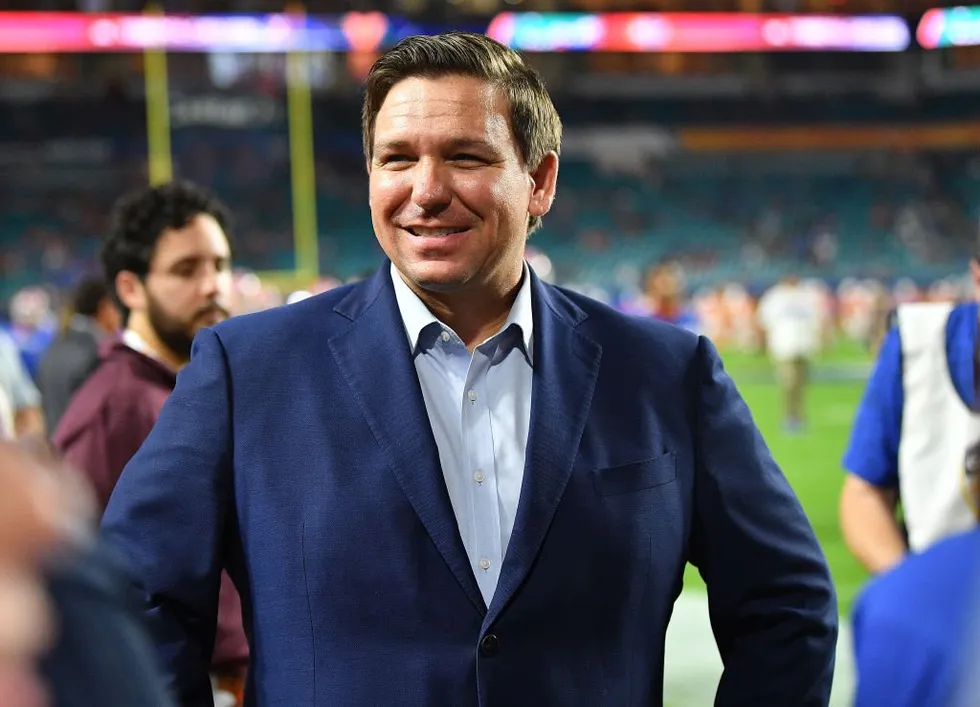 Florida Gov. Ron DeSantis looks on during warm-ups prior to the Capital One Orange Bowl between the Florida Gators and the Virginia Cavaliers at Hard Rock Stadium on December 30, 2019, in Miami, Florida. (Photo by Mark Brown/Getty Images)
Florida Gov. Ron DeSantis looks on during warm-ups prior to the Capital One Orange Bowl between the Florida Gators and the Virginia Cavaliers at Hard Rock Stadium on December 30, 2019, in Miami, Florida. (Photo by Mark Brown/Getty Images)
Ono continued to distance himself from his DEI-filled past during an interview with the University of Florida Board of Trustees on May 27, claiming that his opinions on systemic racism "evolved over time" and that no group or institution should ever be tarred with a "blanket definition or label."
The board of trustees was apparently so eager to make Ono the next UF president that they accepted Ono's explanations regarding his DEI "volte-face" with little skepticism, according to an op-ed from Scott Yenor and Steven DeRose. Yenor and DeRose characterized the BOT as "embarrassing" automatons who simply "nodded" along as Ono attempted to explain away his past.
Yenor and DeRose likewise described Ono as a "dishonorable man," a "fanatical opportunist," and an empty suit.
Yenor and DeRose were not the only ones alarmed by Ono's nomination. Florida Republicans in Congress — Sen. Rick Scott and Reps. Byron Donalds, Jimmy Patronis, and Greg Steube — all voiced their opposition to Ono, as did Donald Trump Jr., Charlie Kirk, and some members of the public.
The Florida board of governors apparently heeded those concerns. Paul Renner, a former speaker of the Florida House and a member of the BOG, told Blaze News that he was greatly "troubled" by the disconnect between Ono's "horrendous record on DEI" and his statements to the UF trustees.
"If you give an interview and everything you've said is directly contradicted by the public record, that's a problem, a problem of candor," Renner said.
Yenor, a political science professor at Boise State University and the senior director of state coalitions at the Claremont Institute’s Center for the American Way of Life, gave Blaze News a similar assessment of Ono.
"He changed his view on a whole host of issues at a convenient time in order to get a job," Yenor explained. "That shows that his convictions are for sale."
Because of Ono's seemingly shallow convictions, DeRose likened him to a "political windsock," borrowing the imagery from another source.
Ono did not respond to a request for comment from Blaze News.
Renner and his fellow members of the board of governors used their interview with Ono in the first week of June to challenge him on his DEI record as well as other issues.
Governor Carson Good, for example, pressed Ono on his decision to require UM students to receive COVID boosters as late as 2023. Despite his background in immunology and experimental medicine, Ono claimed he had simply followed the recommendation of UM health officials, stammering that he is "basically a mouse doctor."
"I don't think he's a strong leader," Renner reiterated to Blaze News, characterizing Ono instead as "opportunistic."
"He's not in the camp of somebody who felt like they had to [promote DEI] to keep their job," Renner continued. "He did it with his own face in a lot of these videos. He cut professional productions that talked about two spirits and transgenderism and thinking beyond the binary."
"He didn't have to do that."
Yenor seems to agree, telling Blaze News that Ono is "not someone who's taken any lumps for changing his views" on DEI.
In response to a request for comment, a DeSantis administration official gave Blaze News the following statement: "The governor appointed people to the Florida Board of Governors who are conservative and aligned to use their judgment, and he had confidence in their ability to be able to discharge this responsibility."
'A very, very, very easy decision'
Ultimately, only six members of the board of governors voted in favor of Ono's nomination. Meanwhile, Renner, Good, and eight other governors voted against it.
That 10-6 vote marked the first time in the BOG's 22-year history that members had rejected a candidate for university president. It may even have been the first vote of its kind in American history.
Most liberals and their allies in the media bewailed the politics involved in the BOG's decision.
'Many of the repudiations that Dr. Ono took were only taken after it was clear he was being seriously considered for the University of Florida job.'
The Gainesville Sun brooded that Ono was "grilled" over so many "flashpoints in the culture wars" — DEI, so-called climate change, and gender-related interventions for minors — that have been "waged by Florida's ruling conservatives."
"It’s an absolute embarrassment. The political questions that were being asked portends more politics in the process and less focus on academics," howled Amanda Phalin, a former BOG member and a current business professor at UF, according to the Miami Herald, which also claimed Ono had been "clearly caught off-guard" by the BOG's questions.
"Because of your insistence on performative politics, you chose to question him repeatedly on hot button political issues and then refused to accept his thoughtful answers," fumed another UF professor, Dr. Michael Haller, who self-identifies as an "ally" of non-heterosexual people, according his X bio.
"No qualified apolitical leader will ever come near our campus again with an eye on sitting in a leadership role."
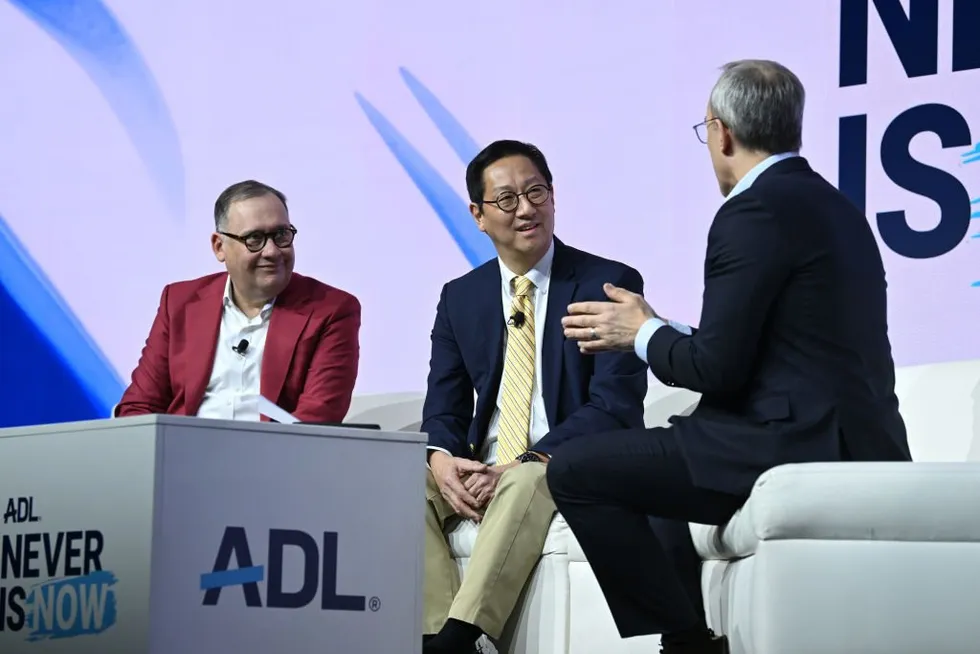 Podcast host Dan Senor moderates a session with WashU Chancellor Andrew D. Martin and University of Michigan President Santa Ono at the ADL Never Is Now event at Javits Center on March 3, 2025, in New York City. (Photo by Bryan Bedder/Getty Images for Anti-Defamation League)
Podcast host Dan Senor moderates a session with WashU Chancellor Andrew D. Martin and University of Michigan President Santa Ono at the ADL Never Is Now event at Javits Center on March 3, 2025, in New York City. (Photo by Bryan Bedder/Getty Images for Anti-Defamation League)
However, Zack Smith of the Heritage Foundation — who, as a trustee of the University of West Florida and Pensacola State College, knows something of the nomination process — denied that Ono was ambushed by the BOG.
"The concern many people had [was] it didn't seem so much as a 'road to Damascus'-type conversion as it did a conversion of convenience, where many of the actions, many of the repudiations that Dr. Ono took were only taken after it was clear he was being seriously considered for the University of Florida job," Smith explained to Blaze News.
When asked whether members of the BOG faced undue pressure from high-profile Florida conservatives to block Ono's nomination, both Smith and Renner disputed that such pressure would have influenced the governors' vote one way or the other.
"If you look at the members of the board of governors," Smith said, "they are not wilting wallflowers themselves. Many have experience in state government and a host of different industries as well, and so I doubt that they were pressured by anyone."
Governor Renner confirmed that "there was a crucible" but added that the heat comes with the BOG territory: "If you don't like pressure on an issue like this, don't sign up for the job."
"For me, this was a very, very, very easy decision."
'Unprecedented'
Because the BOG vote to block Ono's nomination was so "unprecedented," it likewise revealed another problem with the higher-education system: The process to select a university president has seemingly been little more than political theater.
A school typically hires a search firm that then crafts a carefully worded job description that, according to Yenor, will attract a particular candidate or a particular type of candidate — likely one who shares their values. The University of Florida, for instance, may have signaled a preference for DEI-supporting prospects like Ono by hiring SP&A, which describes itself as "a boutique woman- and minority-owned executive search firm."
In Florida, once a board of trustees votes on a candidate, he or she is then passed along to the state board of governors, who until Ono have apparently rubber-stamped every nominee they've been asked to consider.
'Thank you so much for saving the University of Florida.'
Several sources indicated to Blaze News that the BOG was right to be concerned about Ono and to treat his hearing not as a pro forma exercise with the result already predetermined but as an opportunity to vet his true personal and professional character.
"I think the board acted appropriately to ask some very hard, very serious questions of Dr. Ono," Smith said. "Their final sign-off approval was placed there for a reason."
Yenor claimed that the Ono case may yet show that "the era where people defer to the experts is over."
The UF Board of Trustees, especially Chair Mori Hosseini, which had just voted unanimously in support of Ono, blasted the BOG for rejecting his nomination. Hosseini — who has donated generously to Florida Republicans in the past, including more than $1 million to DeSantis' failed presidential bid — called the decision "deeply disappointing."
"You all decided today is the day you’re going to take somebody down," Hosseini told the BOG directly.
RELATED: Florida first lady gives hint on possible run for governor
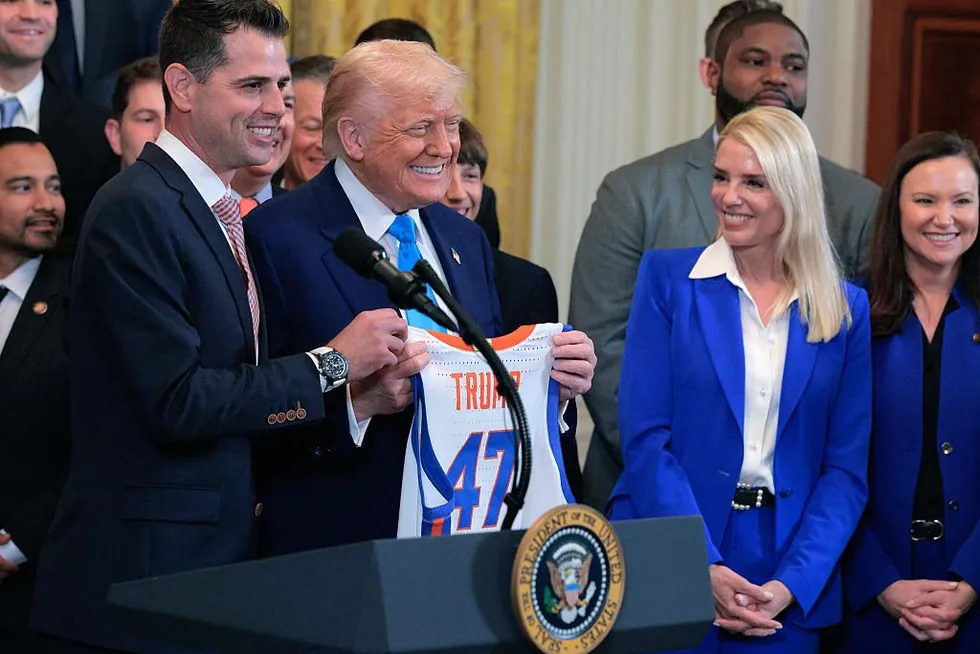 Florida Gators national championship men's basketball team meets with President Trump at the White House. Photo by Chip Somodevilla/Getty Images
Florida Gators national championship men's basketball team meets with President Trump at the White House. Photo by Chip Somodevilla/Getty Images
By contrast, Renner told Blaze News that while he did receive multiple complaints from UF associates about his vote against Ono, some UF faculty members secretly expressed their appreciation for stymieing the Ono nomination. "Thank you so much for saving the University of Florida," he recalled them saying.
For his part, Ono remains loyal to the University of Michigan, the school he ditched in favor of the University of Florida. Though he acknowledged in his resignation message some disagreement with the UM Board of Regents, as of Wednesday afternoon, Ono's X profile still has the hashtag "Go Blue!" In fact, there's even an outside chance that he could stay at the school as a member of the faculty.
The University of Michigan did not respond to a request for comment from Blaze News.
The sources who spoke with Blaze News did not share any insights as to who may be on the radar screen for the UF presidential vacancy, but most are optimistic that the right candidate is out there.
Renner indicated that he or she may be found within traditional academic circles. "There's good people out there," he explained. "I hope they do the right thing the next time around. But if it's the same thing, guess what? It's going to be the same answer. So I hope a message has been sent to pick somebody who is an actual leader on this issue and has all the academic credentials they want."
DeRose and Smith, by contrast, believe that the school should consider candidates outside of academia. DeRose claimed UF must look for a leader from another industry to demonstrate a true commitment to "education reform."
"Florida doesn't need a president who's just now evolving on DEI. They need the anti-DEI 2.0 president," he explained. "You're not going to find that from people who have traditional backgrounds in academia."
"There certainly are other good candidates out there," Smith claimed, "if they kind of widen their search net."
Editor's note: Matthew Peterson, the editor in chief of Blaze News, is a Washington fellow for the Claremont Institute.
Like Blaze News? Bypass the censors, sign up for our newsletters, and get stories like this direct to your inbox. Sign up here!
Originally Published at Daily Wire, Daily Signal, or The Blaze
What's Your Reaction?
 Like
0
Like
0
 Dislike
0
Dislike
0
 Love
0
Love
0
 Funny
0
Funny
0
 Angry
0
Angry
0
 Sad
0
Sad
0
 Wow
0
Wow
0
